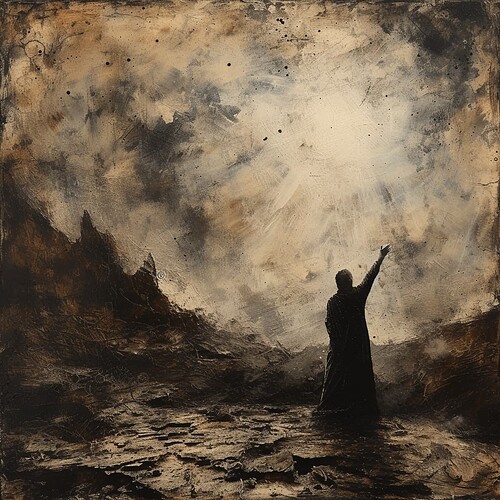 February 26: Psalm 102 - A Cry from Depths of Despair
February 26: Psalm 102 - A Cry from Depths of Despair
An Outpour of Human Suffering in the Face of Divine Mercy
 Introduction
Introduction
Psalm 102, a prayer of an afflicted person, along with its guttural and vivid sorrow, presents itself as deeply relatable, especially in times when we confront severe affliction or despair. It gives words for those times in our lives when we are crying out to God from the depths of our being.
![]() Outpouring of Emotional Turmoil
Outpouring of Emotional Turmoil
This Psalm opens with the desperate pleas of the Psalmist for God’s attention to his pain and distress. He feels his life is fading away, a metaphor for the intense suffering he’s experiencing.
![]() Key Verse: Psalm 102: 1-2: “Hear my prayer, O LORD, and let my cry come unto thee. Hide not thy face from me in the day when I am in trouble; incline thine ear unto me: in the day when I call answer me speedily.”
Key Verse: Psalm 102: 1-2: “Hear my prayer, O LORD, and let my cry come unto thee. Hide not thy face from me in the day when I am in trouble; incline thine ear unto me: in the day when I call answer me speedily.”
![]() Key Themes and Reflections
Key Themes and Reflections
- The Stability of God in the Midst of Human Frailty: The Psalmist contrasts human suffering and fragility against the eternality and steadfastness of God.
- Clinging to Faith Amidst Despair: Even in times of desperation, the Psalmist stays faithful to his belief in God. This teaches us the power of unwavering faith even in challenging times.
![]() Today’s Application
Today’s Application
In times of emotional turmoil, the Psalms remind us that it’s okay to bare our souls before God. He wants us to pour out our grief, stress, despair, and other deep feelings to Him, just like the Psalmist. There’s solace in knowing that our cries do not fall on deaf ears.
![]() Hidden Gem
Hidden Gem
Notice how the Psalmist’s tone changes towards the end of the Psalm. As he recites God’s abilities and supremacy, his hopes begin to rise.
![]() Reflective Q&A:
Reflective Q&A:
![]() What should we do in times of despair according to Psalm 102?
What should we do in times of despair according to Psalm 102?
A: It teaches us to take our grief to God. It’s okay to let Him know about our pain and suffering.
![]() How is the Psalmist’s faith displayed?
How is the Psalmist’s faith displayed?
A: Even in his deepest sorrow, the Psalmist remembers and acknowledges God’s eternal nature and sovereignty.
![]() Join the Discussion:
Join the Discussion:
#AIgniteScripture community! How do you deal with moments of desperation? Share your thoughts on how Psalm 102 talks to you.
![]() See You Tomorrow in Psalm 103: A different tone, where we will explore the mercy, compassion, and love of God in a Psalm of David.
See You Tomorrow in Psalm 103: A different tone, where we will explore the mercy, compassion, and love of God in a Psalm of David.
As we delve deeper into the Psalms, Psalm 102 teaches us that no matter the depth of our despair, God is steadfast, eternal, and unchanging.
